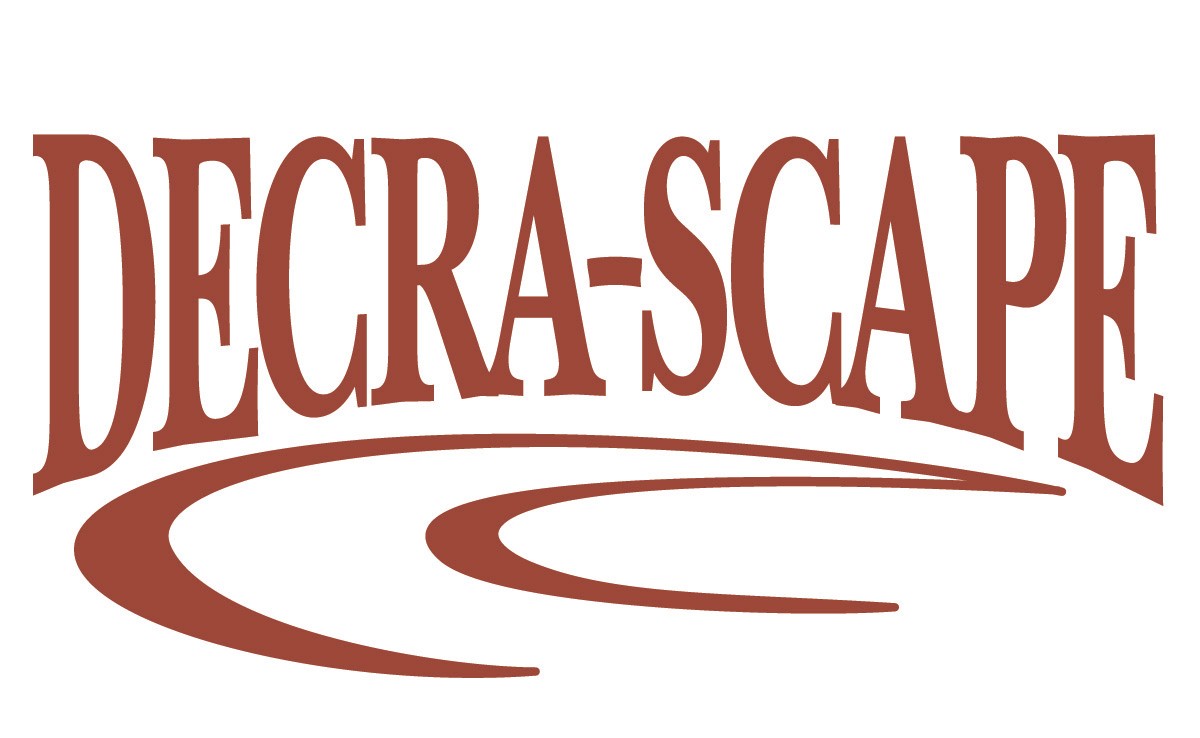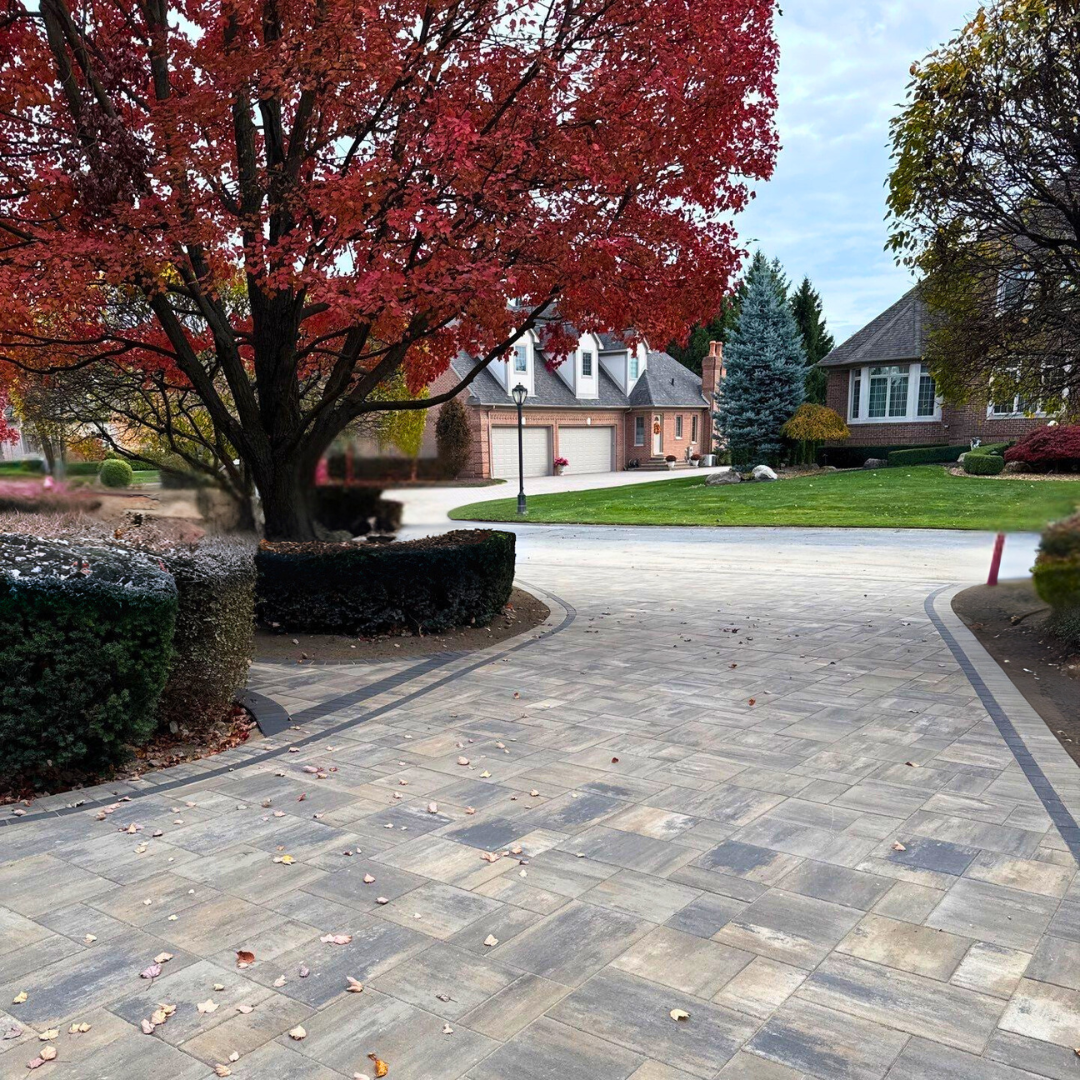There are enough things to worry about in winter, including icy roads, frozen pipes, and endless snow shoveling. Your driveway might not be top of mind during winter, but it’s one of the most functional parts of your property. When it’s time for an upgrade, choosing materials suited to the area’s freeze–thaw cycles will determine how well it holds up through the season.
Such conditions can punish driveway materials, creating cracks, potholes, and dangerous surfaces. But choosing the right driveway material for these conditions can make a big difference in durability, safety, and peace of mind during the winter months.
Here are your options:
Paver Driveways
Paver driveways look great, but also outperform nearly every other material in freeze-thaw conditions. Michigan’s constant temperature swings, moisture, and ice formation can wreak havoc on solid-slab materials like concrete and asphalt. But pavers are built for movement. Each individual unit can expand and contract naturally, relieving the pressure that causes cracking and heaving in other driveway types.
Learn about your paver color options.
Permeable pavers take that durability a step further. Their open-joint design allows water to drain through rather than sit on the surface, drastically reducing the risk of ice buildup. As one Decra-Scape expert explains, “Permeable pavers are an excellent choice for snowy climates due to their ability to manage water effectively and reduce ice formation.”
Beyond their structural benefits, paver driveways are easier to maintain. If a section ever settles or becomes damaged, you can replace individual pavers without tearing out the entire surface (something impossible with poured materials). That keeps long-term costs lower and extends the life of your investment.
Snow removal is also simple. Just use a rubber-tipped shovel or plow to avoid scuffing the surface. Many homeowners also choose to integrate snow-melt systems beneath their paver driveways for the ultimate in winter convenience.
Natural Stone Driveways
For homeowners seeking a more natural look, natural stone—especially bluestone—offers both beauty and resilience. Properly installed on a compacted base with jointing sand or polymeric sand, bluestone can withstand heavy snow loads without cracking or spalling.
While bluestone typically costs more than concrete pavers, it offers a unique aesthetic and a surface texture that provides excellent traction in icy conditions. With proper installation and maintenance, these driveways can last decades while maintaining their color and strength.
Concrete Driveways: Common but Prone to Winter Damage
Concrete remains a common driveway material in Michigan, but it’s not always the best fit for areas exposed to constant freeze-thaw cycles. The solid-slab design that gives concrete its smooth appearance also makes it vulnerable to cracking as temperatures swing between freezing and thawing. Once moisture seeps in and freezes, those cracks expand and worsen with each cycle.
Proper installation can help delay these issues. And using an air-entrained mix and a compacted base improves durability, while regular sealing slows down moisture absorption. But even well-built and maintained concrete surfaces eventually succumb to Michigan’s climate.
As Decra-Scape experts note, “Proper installation, sealing, and maintenance of a concrete driveway are essential for long-term performance, especially in regions with heavy snow. But paver driveways are still preferable.”
By comparison, paver driveways naturally eliminate many of the risks concrete create. Their interlocking design allows movement without cracking, and individual pavers can be replaced easily if damage ever occurs. Plus, pavers offer better drainage through their joints, preventing water from pooling on the surface. This provides a major advantage during snowmelt and refreezing periods.
For homeowners focused on long-term durability, appearance, and easier winter maintenance, pavers are the smarter alternative to poured concrete.
Asphalt Driveways: Quick Fix, Short Lifespan
Asphalt driveways are popular in the Midwest, because they’re relatively affordable and easy to install. Their dark color also helps absorb sunlight, which can melt snow and ice a bit faster on sunny winter days. But while asphalt performs better than concrete when it comes to flexibility, it’s still not a long-term solution for Michigan’s freeze-thaw cycles.
Repeated temperature swings cause the asphalt to soften and harden, eventually leading to surface cracking and potholes. Harsh de-icing salts and heavy plow use accelerate wear even more. Regular sealing can slow this process, but it adds ongoing maintenance costs every few years, and even then, resurfacing is often required after about 15 years.
Paver driveways, by contrast, don’t deteriorate the same way. The segmented system allows natural movement without cracking, and permeable options drain meltwater instead of trapping it beneath the surface. Snow removal is easier too, without worry about tearing up soft asphalt during early spring thaws.
So while asphalt can serve as a budget-friendly choice in the short term, pavers provide the long-term durability that boosts value over the life of the driveway, as well as the visual appeal that Michigan homeowners ultimately prefer.
Gravel Driveways: Budget-Friendly but High Maintenance
Gravel driveways appeal to homeowners looking for a low-cost solution that drains well in winter. Because gravel allows meltwater to pass through freely, it avoids many of the pooling and refreezing issues seen with solid surfaces. It also won’t crack under freeze–thaw stress, making it a practical short-term option.
However, that affordability comes with tradeoffs. Snow removal is more difficult, as shovels and plows can easily push gravel off the surface, leaving uneven patches that require constant raking and replenishment. Even with careful maintenance, gravel tends to shift over time and can track onto surrounding walkways or landscaping.
For homeowners who want a long-term, visually appealing surface that handles Michigan winters without the mess, pavers offer far more value. Their interlocking design provides the same drainage benefits as gravel while delivering strength, structure, and a finished look that enhances curb appeal year-round.
Heated Driveways: The Ultimate Winter Upgrade
For homeowners who want complete peace of mind during Michigan winters, a heated driveway can be paired with pavers or natural stone for unmatched performance. These systems use either electric heating cables or hydronic tubing installed beneath the surface to automatically melt snow and ice, keeping your driveway clear and safe without lifting a shovel.
When combined with pavers or bluestone, a snow-melt system offers unmatched durability and convenience. Pavers allow for easy access to the heating elements if maintenance is ever needed, and their modular design distributes heat evenly across the surface. Natural stone retains warmth longer, helping the system run efficiently and reducing operating costs.
On average, a well-installed heated driveway lasts 20 to 30 years with minimal maintenance. Occasional checks of the system’s components are all that’s needed to ensure peak performance.
Although installation costs are higher upfront, many Michigan homeowners see a heated driveway as a smart investment due to its long-term benefits, which include
Fewer slip hazards
No de-icing chemicals
Zero manual snow removal
Whether installed under a new paver or bluestone driveway, a heated system can help protect your driveway while eliminating danger as well as one of winter’s biggest chores.
Getting Started with Your New Driveway
When selecting a driveway material, think about your budget, maintenance preferences, and the specific challenges posed by your climate. Each material has its strengths, but with the right care and preparation, any driveway can weather the winter months effectively.
Ultimately, the best driveway for snow is one that fits your lifestyle and keeps your property safe and accessible year-round.
Ready to discuss a driveway built to handle Michigan winters? We’d love to discuss the options with you.


